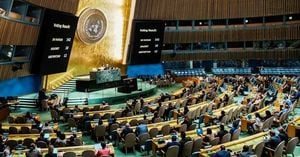International climate change cooperation took center stage on November 13, with the launch of the "International Zero-Emission Island Cooperation" conference during COP29, held in Baku, Azerbaijan. This significant event, hosted by the Chinese delegation, brought together prominent figures from various countries committed to confronting the challenges posed by climate change, particularly for island nations which are facing some of the most pressing environmental risks.
The conference featured notable attendees, including Mohamed Muizzu, the President of the Maldives, who highlighted the unique challenges small island states endure due to climate change. Alongside him, China’s Deputy Prime Minister Ding Xuexiang and prominent international officials, including Simon Stiell, Executive Secretary of the UN Framework Convention on Climate Change (UNFCCC), attended the gathering. The event underscored the collaborative efforts required to reduce carbon emissions and set actionable goals for climate finance.
During the opening remarks, Ding emphasized the importance of international cooperation, stating, "Addressing the survival crisis of islands is a shared responsibility of all humanity." He encouraged nations to work together to build capacity for climate adaptation, particularly for islands, where rising sea levels and extreme weather patterns threaten livelihoods.
Recognizing the urgency of financial support mechanisms, Ding called for contributions not just from governments, but also from the private sector. This aligns with previous discussions at COP29 focusing on establishing effective financial frameworks to support climate-related initiatives globally. The concept of pooling resources from multinational corporations alongside government funding aims to accelerate the development of green technologies and infrastructure necessary for combating climate change.
The backdrop of this initiative lies within the broader objectives of COP29, where negotiations seek to agree on fair and ambitious climate finance goals. These goals include the New Collective Quantitative Goal (NCQG) to facilitate sustainable development and combat climate change's adverse effects.
Azerbaijan has played a pivotal role as the host of COP29, demonstrating its commitment to climate action. The country’s Ambassador to China, Bunyad Huseynov, represented Azerbaijan at the conference, receiving thanks for the nation's excellent organization of the summit.
Meanwhile, the Maldives, often dubbed one of the frontline nations concerning climate change, has been vocal about the existential risks it faces. President Muizzu articulated the dire need for adaptation strategies, stating, "Without global cooperation, we will continue to suffer and eventually lose our homes to the rising seas." His remarks reflect the sentiments of many leaders from small island countries who fear their nations may not survive the current climate crisis without aggressive intervention and support.
Prominent small island leaders, including Grenadian Prime Minister Dickon Mitchell and Sao Tome and Principe's Prime Minister Patrice Trovoada, echoed similar concerns, advocating for stronger partnerships and technological exchanges to enable more effective responses to climate risks. Importantly, the conference focused on creating systems for sharing best practices and resources among island nations, which collectively face similar issues.
Equally important was the discussion about clean energy systems suited to local conditions. Ding urged the promotion of green and low-carbon transformations across islands, fostering clean energy developments alongside protecting marine ecosystems. This approach aligns with global climate agreements aiming for net-zero emissions.
The discussions at COP29 are integral to the UNFCCC's long-term vision for achieving climate justice, especially for vulnerable communities. By addressing the interconnected challenges of climate adaptation and mitigation, stakeholders aim to uplift entire regions impacted by adverse climatic changes.
With COP29's agenda encompassing various climate action-oriented initiatives, topics include sustainable development, climate resilience technologies, and innovative green policies. The international community has rallied around these efforts, signifying a significant shift toward collective action against climate change.
Looking forward, participants of the conference expressed optimism for tangible results from the commitments made. The integration of financial and technological support for island nations is seen as pivotal to enhancing resilience against climate change and protecting vulnerable communities.
Overall, the International Zero-Emission Island Cooperation conference highlights the urgent need for global solidarity and cooperation to tackle climate change. The collaborative initiatives discussed at the conference not only aspire to improve the adaptability of island nations but aim to build sustainable, prosperous futures within the framework of environmental stewardship and responsibility. The collective vision presented at the event inspires hope for future climate negotiations as nations recognize their shared fate on this fragile planet.



